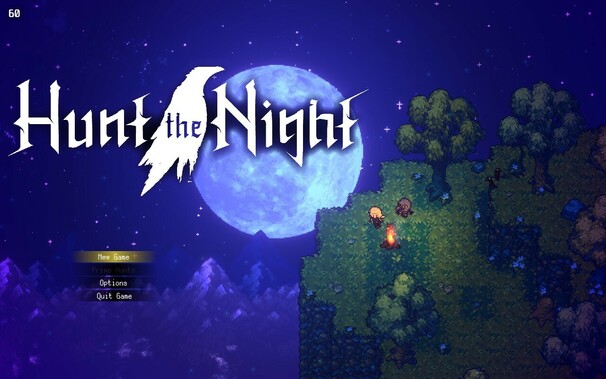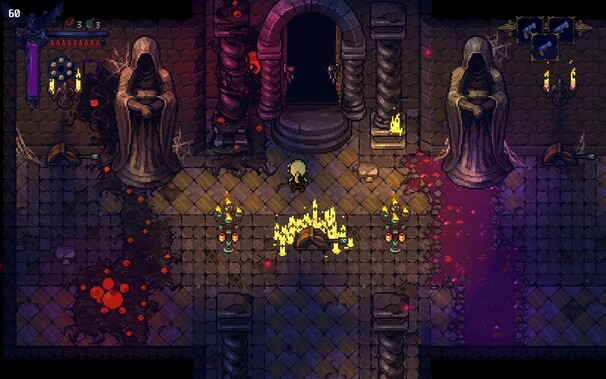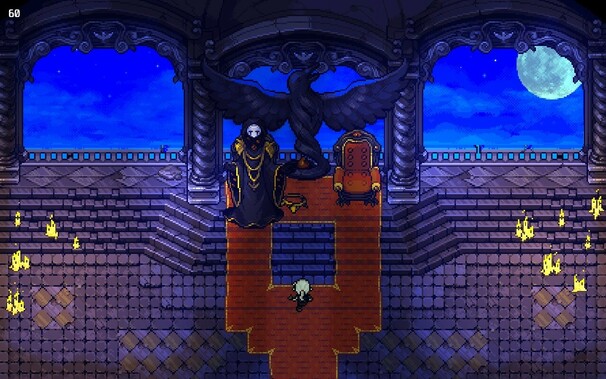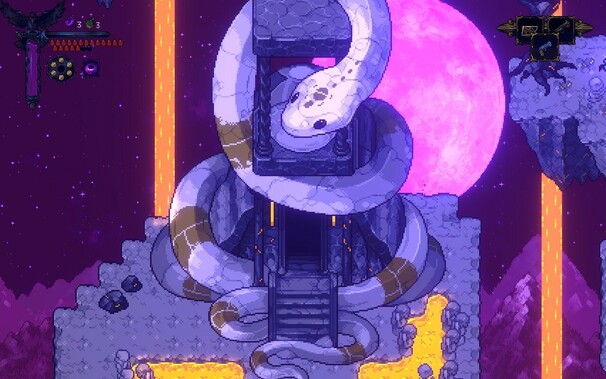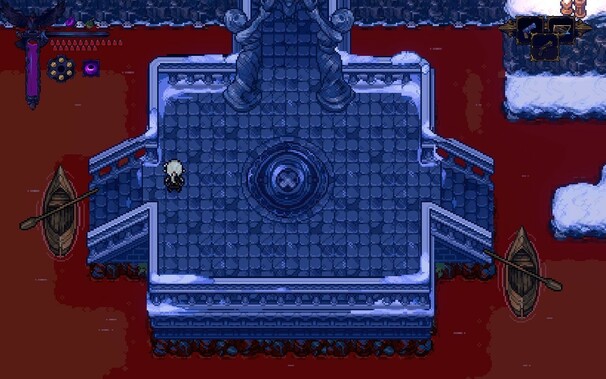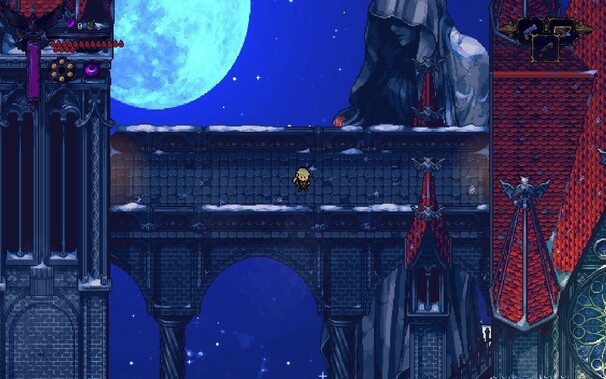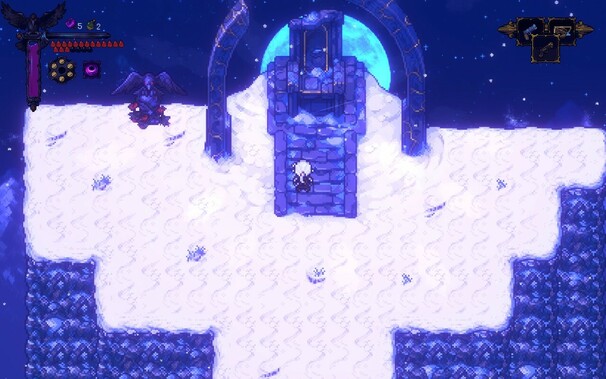Hunt The Night Review
I was intrigued into giving Hunt The Night a try by its retro style and fairly narrow scope. A classic example of easy-to-learn and hard-to-master. I was not disappointed, but I’m also not afraid to admit that Hunt The Night was far, far, far too difficult for me.
If Hyperlight Drifter could be darker and grittier somehow then Hunt The Night would be what you might expect. Even down to the projectile weapon that refills when you hit enemies/smash objects. Hunt The Night depicts a world of eldritch horrors erupting from a battle between Day and Night. The cycle of light and dark has been forced wildly out of whack by magical meddling and from this central theme grows an enigmatic narrative told via in-game collectables, character interactions and the environment itself.
The gameplay itself is competent, but a little lacking in finesse. For a game that demands so much control and precision it doesn’t necessarily offer you the tools required to attain it. Of course- I could just be terrible at Hunt The Night. In fact, I am thoroughly terrible at Hunt The Night.
I’ve been playing and enjoying Hunt The Night, but I keep getting completely wrecked by the bosses 😭 took about an hour and a half of attempts on the robey geezer depicted here.
Reminds me very strongly of Hyperlight Drifter, though it’s a little rough around the edges and doesn’t feel as tight.
While the main gameplay loop and overworld enemies gave me enough trouble, where I really fell flat was the bosses. They don’t just hit hard, but hit fast and almost all work in multiple phases between which there’s no respite. The first boss I beat with a little effort in a few tries. The second took me something like an hour and a half of attempts to finally down. Subsequent bosses don’t get any easier, though they do get rather imaginative, devious and all-out bullet hell. I’m not ashamed to admit that pure happenstance – a release patch for Hunt The Night breaking backwards compatibility with savegames – led me to delve into the game’s save format and find some choice variables that I could use to add the missing difficulty adjustment back. I made the game easier. Much, much easier. And, you know what? I enjoyed it. Cope!
The frustrating second boss seemed, insofar as I could tell, to have a completely undodgeable attack in its second phase which tended to wreck me. I even tried Umbra- an ability that effectively lets you teleport- in order to try and escape its clutches, but the game designers had not anticipated my lateral thinking. In fact I’m not sure any bosses demand use this ability, since the arenas are too small and too crowded and the ability is very, very slow.
Unlike – to pull an example completely out of thin air, honest – Elden Ring, Hunt The Night doesn’t have quite so much scope to explore and gain better gear or a stronger character before tackling a given boss. Sure there might be weapons or items you overlook, but in most cases they give only a slight edge and pure skill is absolutely the core tenet upon which success is based.
Difficulty aside the world building and environments of Hunt The Night are compelling and varied, giving a real sense that you’ve traveled to the far corners of its world and back in order to complete your main objective. Between floating temples, snow fields, rivers of blood and deadly marshes every region feels uniquely crafted and brings about its own challenges and considerations.
There’s plenty of variation in the world of Hunt The Night with some glorious set pieces. It’s all artistically cohesive and that moon sure loves to make an appearance.
Among these challenges are puzzles, real, actual, puzzles. Many of them can be handily brute-forced, or are largely self-explanatory and straight-forward once you’ve explored enough to find the answer, but their existence is a refreshing change of pace from being stomped by monsters. A few of the puzzles have audio/visual counterparts as if some consideration for accessibility had found its way in amidst the punishing difficulty. I thought this was a nice touch, even if it’s a little redundant. Sort of like putting stairs on the last few feet of the Everest summit.
While death is certain, inevitable and common you don’t lose anything but time, and most bosses are a short run (and a cut-scene) away. The game reveals some clunk when saving/loading though, since it takes a glacial age for something that’s ostensibly retro. I played the game through on the Steam Deck, moving it from my Kioxia microSD to internal SSD didn’t make any difference. Load times and scene transitions are stubbornly sluggish.
As the game progresses you’ll find new weapons and gear, unlock upgrades or buy your way to a bigger health bar. There is very little depth and complexity to the gear systems, but just enough to let you pick a play-style that suits you. Weapons have a fairly typical tradeoff between speed and damage. If you’re aiming to pull off precise, not-so-greedy, strategic hits on a boss – assuming you can stay alive long enough… I can’t – then you might use a honkin’ great two-handed sword with a slow wind-up but more focused damage. If you’re nimble enough to nip around and hack away at multiple targets then you might find claws more to your taste. There are also equipable secondary skills that can complement your play-style.
The upside of a streamlined gear system is that you’ll never have to worry about inventory management or any of the mindless item juggling tedium that can bog down a game. Instead you can focus on grabbing all the game lore and perfecting your offensive and defensive skills.
Back-tracking is fairly minimal and usually leads you back through more combat to a hub room that branches out into other locations. Some better examples of this involve looping around to the base of a building only to then unlock an entry way, drop to the basement, fight a boss, winch back up to the base, leg it up to the top of the building and do it all again. This sounds tedious but the whole process is a labyrinth of battles, puzzles and lore that keeps things interesting.
In the late game you’ll find yourself battling through multiple temples to unlock a central building. Each has its own theme and unique challenges, which range from tropes of the genre- lots-o-timed-jumping- to some fresher ideas.
I really enjoyed Hunt The Night. It’s atmospheric, moody and full of great little ideas that all feel consistent and cohesive. It is, unfortunately, unapologetically difficult and lacks any difficulty or accessibility settings to compromise on this – savegame editing notwithstanding – so I’d recommend it only if you’re ready for a heck of a challenge.
Hunt The Night has had a couple of updates since I started playing, and some feedback from the team behind it on the Steam community forums. It’s also had a 1.1 patch since I finished playing that addresses player concerns and overhauls keyboard/mouse input (I played using the Steam Deck’s controls).
